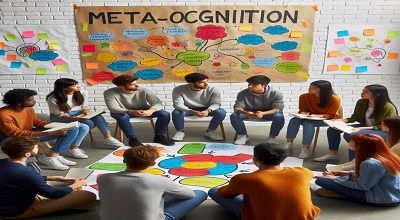Metacognition Can Improve Learning Outcomes
How Metacognition Can Improve Learning Outcomes? Metacognition is the awareness and understanding of one’s own thought processes. It involves thinking about and reflecting on how we learn, understand, and solve problems.
When applied effectively, metacognition can significantly improve learning outcomes in various ways:
- Enhanced Self-Regulation: Metacognition helps learners set goals, plan their study strategies, and monitor their progress. This self-regulation can lead to better time management and improved study habits, resulting in more efficient learning.
- Improved Problem-Solving Skills: Metacognitive awareness allows learners to break down complex problems into manageable parts, plan their approach, and evaluate their strategies. This helps them become more effective problem solvers.
- Increased Motivation: Understanding one’s learning process and having the ability to adapt it can boost motivation. When learners see that they can make improvements through metacognitive strategies, they’re more likely to stay engaged and persistent.
- Better Memory Retention: By actively monitoring their comprehension while studying, students can identify areas of weakness and use techniques like summarization, self-testing, and elaboration to enhance their memory retention.
- Deepened Understanding: Metacognition encourages critical thinking and reflection on the material being learned. Learners can ask themselves questions like, “Do I really understand this?” or “Can I explain it to someone else?” This helps move knowledge from a surface level to a deeper, more meaningful level of understanding.
More here…
- Improved Self-Assessment: Metacognition allows learners to assess their own understanding and performance accurately. This self-assessment can help them identify areas where they need more practice or clarification.
- Effective Decision-Making: Metacognitive skills can extend to decision-making processes. By considering different options, evaluating potential outcomes, and reflecting on past decisions, learners can make more informed and effective choices.
- Transfer of Knowledge: Metacognitive strategies can help learners apply what they’ve learned in one context to another. They become better at recognizing similarities and differences between different situations, which leads to improved transfer of knowledge and problem-solving skills.
- Reduced Cognitive Load: Awareness of one’s own cognitive processes can help individuals manage their cognitive load effectively. By recognizing when they’re overloaded or overwhelmed, learners can take steps to reduce stress and improve focus.
- Lifelong Learning: Metacognition fosters a growth mindset and encourages a habit of continuous learning. It helps learners become more self-directed, which is a crucial skill in the ever-evolving landscape of knowledge and technology.
Last Words
Incorporating metacognition into educational practices often involves teaching students explicit metacognitive strategies, encouraging self-reflection, and providing opportunities for self-assessment and goal setting. Additionally, instructors can foster a supportive learning environment that values students’ metacognitive growth.
Overall, metacognition is a powerful tool that empowers learners to take control of their own learning processes, leading to improved learning outcomes and long-term academic and personal development.
